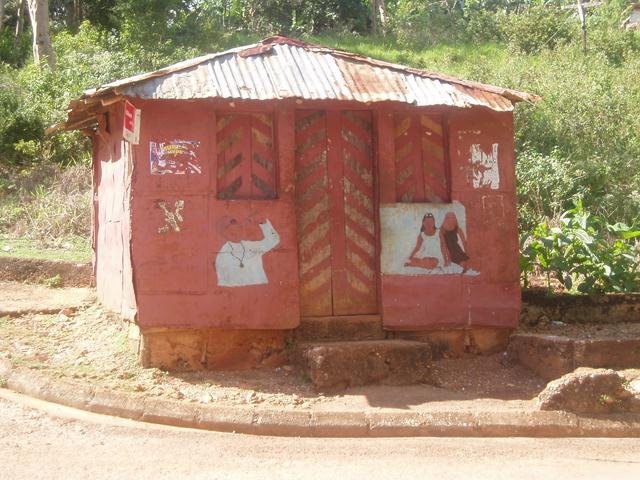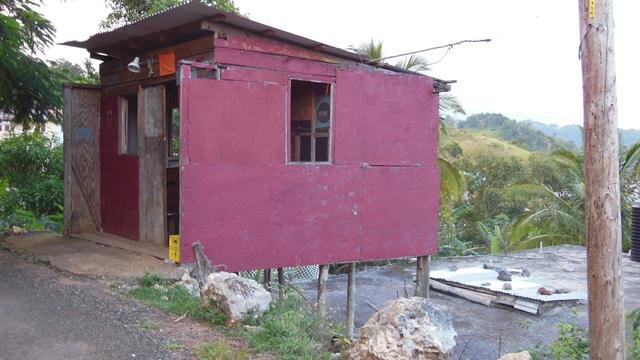If you are out and about in Jamaica check out one of the locally owned shops and bars if you are feeling thirsty or want a snack. The prices are slightly higher than the supermarket, but they are nowhere near as expensive as the tourist places and you will get to mingle with the locals. You can easily spot them from the hand painted designs, customised illustrations and invariably the Jamaican Flag or colours proudly represented in the design. It is popular in the smaller shops that the merchandise is kept behind the counter with a mesh screen rising to the ceiling, the small ‘hatch’ at the front enables the customers to order and pay for the goods and to be served. You can find these establishments scattered all over the island, on or around the land where the vendor lives, by the roadside, or any other ‘profitable’ location that can be found. They serve passing trade and the local community, when a bigger supermarket is unnecessary or too far away. If you are on the road and want a snack and a drink, this is what you can expect to find and pay inside:
Cost of Food and Drinks
Average Prices of beverages:
- Soda / Fizzy drinks (large personal sized), such as Bigga, D&G are approx. $80
- $70 Soda / Fizzy drinks (medium-sized), such as Bigga, D&G are approx .$50
- Soda / Fizzy drinks (small child size), such as Likkle Bigga, D&G are approx. $40
- Fruit drinks, such as Tampico are approx.$100
- Bottled Water, such as WATA or Catherine’s Peak, are approx. $60 – $70
- Cranberry water are approx. $70 to $80
- Nutritional drinks, such as Supligen are approx. $180
- Energy Drinks, such as Boom and Red Bull are approx. $150
- Bag Juice, flavoured water that is often frozen / chilled are approx. $20 – $40
- Beer and stout, are approx. Red Stripe $160, Dragon Stout $170 and Guinness $180
- Wines, are approx. Magnum $200, Red Label Wine $140 to $300 for a large size.
- Liquor, such as a shot of Wray & Nephew is generally $100 rising to $150 if ‘chased’ with soda or juice (you might be required to buy the can / bottle of chaser).
- Liquor, such as a ‘flask’ (UK quart bottle) of Wray & Nephew is generally $450 – $500 and works out most cost-effective if you are planning of drinking more than 2 shots.
- Please note international liquor such as Brands of Brandy/Cognac sold in the UK are as much as $500 for one drink/glass… and that doesn’t usually include a chaser – so be warned!
Average Prices of Snacks:
• Bun, Individual round fruit bun $70 or cheese bun are generally $80 – $90
• Bag snacks, such as Cheezesticks $10, Tigers Cheese Snacks $35, Cheezees $40
• Banana Chips are approx. $50 and Plantain Chips, are approx $70
• Bulla, (try with ripe banana or pear/avocado) are approx. $45 – $50
• Sweets / Candy starts from $5 to $15, bon bons (lollipops) are approx. $15 – $20
• Bread (or mongoose bread, because it is long and thin), small long sweetish tasting baps are approx. $130
These Prices are Correct as of June 2013 and are based on average prices collated from in and around rural St. Ann’s.
PLEASE NOTE: All monetary values in this article using the ‘$’ sign as a pre-fix; refer to the Jamaican National Currency of Jamaican Dollars.
Building Materials
Local shops are ‘self- made’ by the owner and built with their friends and family giving a hand, or if the construction is beyond their own capabilities someone will be paid to build it . If you want to build your own shop, or lend a hand to someone else, you will need the following materials:
[list style=”1″ underline=”1″]
- Ply board or ‘planks’ of wood for the roof, walls, floor, windows, doors, display shelves and counter
- Hand-cut thin young saplings for the framework and posts, counter, door and window openings
- Zinc (corrugated metal sheeting), flattened metal drums or containers to cover the roof and the sides
- Wire mesh for the counter grill
- Tarpaulin or ‘crocus bags’ (empty rice or flour bags) to line the inside
- Linoleum for the floor and countertop.
- Screeded cast floor with rocks mixed in for strength
- Should more money be available to invest in the construction then blocks (thermalite or breeze block style) would be used to make the walls
- Roof and floor would be cast or decked (screeded) in concrete
- Tiles are often used on the floor
Coming from a construction background I am always AMAZED at the tenacity Jamaicans show in building shops (and houses, but that’s another story!). Not only in terms of where you wouldn’t think it was possible, petering on the side of hills and rock faces, the length and breadth of roadsides, on stilts with gangways and generally anywhere they are able to get a foothold, but also the use and recycling of materials is undeniably ingenious!
Stocking the Shop
Local shop owners buy products and merchandise from wholesale vendors in the larger towns, whilst others feel they can get more choice or better deals by travelling to Montego Bay or Kingston to buy their stock. There are also Goods Trucks in certain areas which circumnavigate the small country roads serving communities and vendors that are unable to travel to buy goods themselves, or those whom prefer the ‘home delivery’ method; this service provides a valuable resource and can cut travelling / sourcing expenses for some traders.
Sometimes the owners may raise livestock, such as chicken for meat and eggs, hogs (pigs), goats or grow produce which they sell as their sole product lines, or as an addition to complement the purchased stock. The owners will often start selling a small range of products that are readily required by the local community, such as, food stuffs, cosmetic and personal hygiene products, clothing, cleaning products, farming supplies, cooked food and invariably liquor and beverages.
The more fortunate are able to make enough profit to extend their business in some way, such as investing in wider product lines and a fridge or freezer to accommodate chilled and frozen products. A television, DVD player and / or a hi-fi (sound system) is also a popular investment that is blasted loudly to attract customers to stay longer (and hopefully spend more!) Some of them may increase the size of the shop, or upgrade the construction type in time. It is likely that you will pay a little extra for goods bought from these vendors compared to the larger supermarkets, as they do not have the same leverage and dependant of the size of the shop there might be a limited choice of items. I have to say though that I am always amazed at how many products these canny vendors manage to fit in their shops and I like to support them too.

Source of Income
The owners of these establishments often rely on the sale of goods as their sole source of income, which invariably includes their cost of living, sending their children to school, healthcare and so on, so the passing custom is a welcome addition to the local community trade. I have yet to find a miserly shopkeeper and the majority are rightly proud of their achievements in opening their business places, no matter how ramshackle it may seem to those accustomed to the local ‘corner’ stores in their home country. Please bear in mind that they need to sell 24 sodas to make around $400 or 24 bottles of beer or stout to make around $1,000 profit, which is hard work. So please stop, treat the owner with respect, greet them with a smile and a cordial greeting using Miss, Madam or, Sir especially to those who are senior to you in age and experience the warmth of the locals and help support them in their endeavours.
A point of note:
Be wise and respectful. You may find yourself centre of attention if you waft in with a fistful of notes or a bulging handbag or purse and your latest mobile (cell phone) in your hand when purchasing a drink or snack, and the locals may think you are acting ‘bosey’ (showing off) if they do not have that amount of cash readily available. A $500 bill, or a few $100 bills are suffice if only buying a few snack items. Carry Jamaican cash with you, it’s the national currency after all and it isn’t that hard to decipher the exchange rate. Plus, you are more likely to find it easier to use than UK Stirling £ and USA Dollars $ especially in smaller rural areas, whereby it will be harder for you to receive the correct change (which will nearly ALWAYS be in Jamaican Dollars $).
Don’t Worry Be Happy!
Sometimes if there are locals around they will stop and have a chat and share an anicodote or two, which can be very amusing. Children are often more intrigued by the new face and as is usual for children, they may either openly stare at you, or may hide and peep at you wanting to take in the new sight. I have never met any hostile response to my arrival and one of the most endearing experiences had been a small toddler who came over to touch my leg as she thought I looked like a dolly!
I generally try to break the ice by simply treating people with the respect they deserve; smiling or nodding my head whilst looking the person directly is usually enough to break them out in a warm and responsive smile. Although it will be seen as seriously strange and humorous behaviour if you start walking around manically nodding and smiling at everyone! If the mood takes you it never hurts to show a random act of kindness, buy a handful of sweets / candy and hand them out to the children…. think about it.
Jamaicans are proud people, and rightly so, they do not let many things hold them back from eking a living somewhere. If you only stop and look, you will also notice the enterprising ways in which they make ends meet. Although you may get better deals and choice at the larger supermarkets in the towns, you will invariably need to buy a few supplies, or at the very least buy a drink or snack (bun, banana chips, cookies and so on) whilst driving through the interior of the country, so don’t be shy get out there and frequent these shops. You will be pleased you did!




